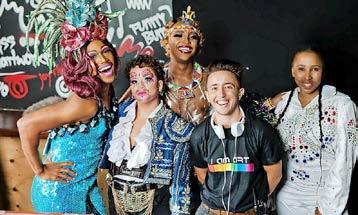
4 minute read
’No Hiding Here’ brings fun, gay love to forefront
JAMAL GROOTBOOM jamald.grootboom@inl.co.za
QUEER cinema in South Africa has come a long way and No Hiding Here as the country’s first gay romantic comedy is making more waves.
Advertisement
Directed by local queer film-maker Gabe Gabriel (he/ him/they/them), No Hiding Here is set in a small South African town where a beloved drama teacher accidentally plays gay porn during the biggest school event of the year.
This forces him, and the event’s guest and featured artist – a closeted big city celebrity – into hiding from the outraged community.
Gabriel moves between Cape Town and Los Angeles, where he has been working as a writer, director, actor and independent film producer since 2013.
We spoke to him about No Hiding Here, what it was like filming through the pandemic and his hopes for the future of local queer films and TV.
No Hiding Here director Gabe Gabriel.
What inspired you to make No Hiding Here?
Nagvlug producer, Zandré Coetzer, approached me with the idea to write a “warm and fuzzy” gay South African romantic comedy for Showmax. .
So I got together with two other queer writers, KellyEve Koopman and Nico Scheepers. We brainstormed ideas that would keep our story small and contained (for budget reasons) but still feel to some degree universal and magical.
I always take moments that happen in real life. Let’s just say I’ve accidentally played some explicit adult content through my laptop at a really inappropriate moment so … that’s sort of what inspired the “inciting incident”.

No Hiding Here director Gabe Gabriel.
Why do you think it’s important to have more LGBTQIA+ representation in the South African film and television industry?
Despite our progressive constitution, queer bodies in South Africa are no strangers to violence. Just last year, our community lost a friend and a queer mother, Kirvan Fortuin, to a homophobic attack.
There is a lot of work to be done to put an end to this type of gender and sexualitybased violence and our job as artists is to tackle those issues.
I think paradigm shifts in culture and society happen largely in tandem with shifts in media and representation.
No Hiding Here attempts to win over the empathy of our country’s leading streaming platform. We hope that if there is a movement in the hearts of the TV-watching population, anti-LGBTQIA+ systems and constructs will lose popular support.
The intention with a film like ours is to “normalise” queerness to the everyday TV viewer in the hope that they will understand it better. Often the threat of violence comes from a fear of the other and insecurity around not understanding something.
The movie debuted on Showmax. What has the reception been like?
To see how many queers dropped their plans last weekend to support the film, it was beautiful. And the feedback is that they want more. We are so eager for queer content, so hungry for that sense of representation that says “I see you. You and your love are valid.”
The other great thing is that there hasn’t yet been any major backlash which I’m hoping will send the message to the powers that be at M-Net and Showmax that their audiences can handle more than they think.
Why do you think South Africa is still lagging behind with queer representation in media?
I think our industry has been starting to pick up in the past couple of years as film-making is becoming more accessible so I think it’s just a matter of quantity. We don’t generate as much work locally as they do in, for example, Hollywood. But let’s look at the two industries comparatively: GLAAD said in its annual Studio Responsibility Index in 2018 that of the 109 releases by the largest movie studios in Hollywood, just under 13% included LGBTQIA+ characters. South Africa has made far fewer films but in recent years we’ve seen major films such as Kanarie and Inxeba do really well. So my point is that I don’t think we’re behind, per se. But I do think we have a long way to go as an industry, globally.
What do you think this movie will mean for the queer community?
So many South African queers have approached me or messaged me to tell me how much it means to them to see OUR stories; OUR love on their screens and to be able to share that with friends and family and use the film as a tool to spark empathy in those around us so that we may be more accepted. Some baby queers have said seeing their family’s reaction to the film (which is so light-hearted and cheesy that you really can’t hate it) has given them the courage to come out.
What is your hope for the future of LGBTQI+ representation in the local media?
That we get to make more and more and more. That more people give money to more queers to make more content until there’s literally something for everyone.

No Hiding Here director Gabe Gabriel with members of the cast.








